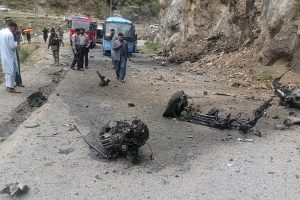On March 26, a suicide bomber rammed his explosive-laden car into a convoy of Chinese engineers near Besham in Pakistan’s Khyber Pakhtunkhwa province. The convoy was en route from Islamabad to the site of the Dasu hydropower project, a 4,320-megawatt power project on the Indus River. The attack left five Chinese engineers and their driver dead.
This was the third attack targeting Chinese projects and nationals in Pakistan since March 20. Earlier, the Baloch Liberation Army’s suicide squad, the Majeed Brigade, tried to enter the Gwadar Port Authority (GPA) complex on March 20 and Pakistan’s second largest naval airbase, the PNS Siddique, in Balochistan on March 26. Pakistani security forces repulsed both attempts, but not without casualties among security personnel. (It bears mention that the GPA complex houses Chinese workers while its drones are stationed at the PNS Siddique.)
No group has claimed responsibility for the suicide attack in Besham.
Amid Pakistan’s deteriorating security situation, the fresh wave of attacks against Chinese projects and nationals can slow the progress on the China-Pakistan Economic Corridor (CPEC), the $60 billion centerpiece of China’s Belt and Road Initiative, comprising infrastructure, energy, and industrial projects. In the aftermath of the attack, China has suspended work on the Dasu and Tarbela fifth extension hydropower projects.
On the one hand, the Besham attack will raise concerns about the efficacy of Pakistan’s security measures to protect Chinese workers and projects. On the other, it will undermine the fledgling Pakistan Muslim League-Nawaz (PML-N)-led coalition government’s effort to negotiate new projects with China under CPEC’s second phase.
The Besham suicide attack is the second time that militants have targeted the Dasu hydropower project. In mid-2021, another suicide bombing targeting a bus of Chinese engineers left nine of them dead. Interestingly, no group claimed responsibility for that attack as well. In July 2023, Pakistan set up a task force, comprising personnel of the Pakistan Army, the Punjab Rangers, police, and Gilgit Baltistan Scouts, to protect the Dasu hydropower project.
The Besham attack will raise serious questions about the task force’s efficacy. It can be expected to revive the old Chinese demands of allowing private security companies to protect Chinese projects and nationals in Pakistan.
The timing of the attack is critical; it has come ahead of Prime Minister Shehbaz Sharif’s expected trip to China, his first after assuming office for the second time. In April 2022, a suicide attack on the Karachi University’s Confucius Center similarly disrupted Sharif’s visit to China.
It remains to be seen if his upcoming trip will be delayed or goes ahead as scheduled. Even if the visit materializes, it will be overshadowed by discussion on security, and Sharif will not find many takers for his economic proposals in Beijing.
Since 2018, Baloch separatists have spearheaded the anti-China militancy in Pakistan. The BLA’s Majeed Brigade targeted the Chinese consulate in Karachi in 2018, the Pearl Continental hotel frequented by the Chinese in Gwadar in 2019, the Pakistan Stock Exchange (where Chinese companies have 50 percent shares) in 2020, and Karachi University’s Confucius Center in 2022, among others.
But other groups have targeted Chinese nationals in Pakistan as well. The Islamic State’s Afghanistan-based branch was involved in the kidnapping and killing of a Chinese couple in Quetta in 2017.
The Tehreek-e-Taliban (TTP) and its affiliated factions have been closely allied with the Uyghur militant group, the Turkestan Islamic Party (TIP). The TTP provided shelter to TIP militants in their strongholds in the Newly Merged Tribal Districts until 2014. In the mid-2010s, a TTP faction was also involved in the abduction of a Chinese tourist.
However, since 2020, the group has distanced itself from anti-China militancy and also shied away from raising the issue of the Uyghur Muslim community in its propaganda literature. Interestingly, the TTP walked back its claim of targeting foreign nationals in the Quetta Serena Hotel attack in 2021 after learning of the presence of then-Chinese Ambassador to Pakistan Nong Rong at the hotel.
Nevertheless, Pakistani authorities attributed the mid-2021 attack on a Chinese engineer to a local commander of TTP’s Swat faction, Muhammad Tariq Rafiq alias Button Kharab, who was working as a freelance jihadist. Freelance jihadists keep shifting loyalties from one group to another, and material rather than ideological considerations drive their motivations. Though the TTP does not have an elaborate presence in the adjoining areas of the Dasu hydropower project, its remnants are still active as freelance militants. It bears mention that the TTP has denied involvement in the Besham suicide attack.
The sudden uptick in attacks against Chinese interests and nationals in Pakistan has to be situated in the overall rise of militancy in Balochistan and Khyber Pakhtunkhwa provinces. Since the Taliban’s takeover in neighboring Afghanistan, terrorism has risen by 73 percent in Pakistan. Hence, without an improvement in the overall security situation, protecting CPEC in isolation is wishful thinking.
Pakistan will have to revisit its counterterrorism and counterinsurgency frameworks, as well as its border policies given the sanctuaries of jihadist and ethno-separatist groups in Afghanistan and Iran. Only can then Pakistan stem the tide of militancy in the country.

































